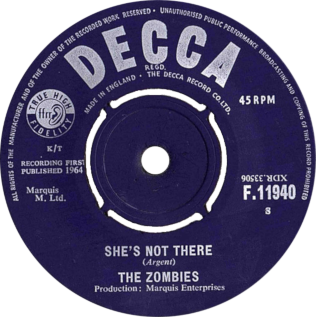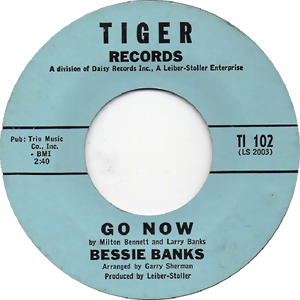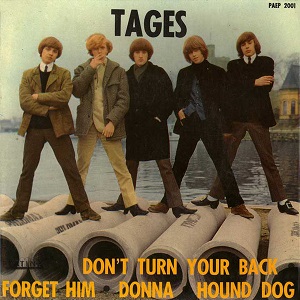Related Research Articles

"I'll Be Doggone" is a 1965 song recorded by American soul singer Marvin Gaye and released on the Tamla label. The song talks about how a man tells his woman that he'll be "doggone" about simple things but if she did him wrong that he'd be "long gone". The song was written by Miracles members Smokey Robinson, Pete Moore and Marv Tarplin, initially for The Temptations, who rejected the song.

"Bad Boy" is a song written and recorded by American R&B musician Larry Williams. Specialty Records released it as a single in 1958, but it failed to reach the U.S. Billboard charts. However, music journalist Stephen Thomas Erlewine calls it one of Williams's "genuine rock & roll classics" and notes its popularity among 1960s British Invasion groups, such as the Beatles.

"Please, Please, Please" is a rhythm and blues song performed by James Brown and the Famous Flames. Written by Brown and Johnny Terry and released as a single on Federal Records in 1956, it reached No. 6 on the R&B charts. The group's debut recording and first chart hit, it has come to be recognized as their signature song.

"She's Not There" is the debut single by the English rock band the Zombies, written by keyboardist Rod Argent. It reached No. 12 in the UK Singles Chart in September 1964, and No. 2 on the Billboard Hot 100 in the United States at the beginning of December 1964. In Canada, it reached No. 2.

"Go Now" is a song composed by Larry Banks and Milton Bennett and first recorded by Bessie Banks, released as a single in January 1964. The best-known version was recorded by the Moody Blues and released the same year.

"Donna" is a song written by Ritchie Valens, featuring a I IV V chord progression. The song was released in 1958 on Del-Fi Records. Written as a tribute to his high school sweetheart Donna Ludwig, it was Valens' highest-charting single, reaching No. 2 on the Billboard Hot 100 chart the following year.

"Let's Dance" is a 1962 hit single by Chris Montez, written and produced by Jim Lee.

"Little Queenie" is a song written and recorded by Chuck Berry. Released in March 1959 as a double A-side single with "Almost Grown", it was included on Berry Is on Top (1959), Berry's first compilation album. He performed the song in the movies Go, Johnny Go! (1959) and Hail! Hail! Rock 'n' Roll (1987). One year earlier, Berry had released "Run Rudolph Run", a Christmas song with the same melody.

"Miss Mac Baren" is a song by the Swedish rock band Tages, released as a single in November 1966. It was written by all five members of the group and was recorded during the sessions for their third studio album, Extra Extra, but was ultimately excluded from it. The B-side, "Get Up An' Get Goin'", was however included as the fourth track on the album. "Miss Mac Baren" got its first album release on Tages Hits Vol. 3, a compilation album released in August 1967.

Åke Gerhard was a Swedish songwriter. His songs won the title for the first three years of Sweden's Melodifestival: In 1958 "Lilla stjärna" Little star sung by Alice Babs, in 1959 "Augustin" sung by Siw Malmkvist with lyrics by Harry Sandin and in 1960 "Alla andra får varann" Everyone else gets each other with lyrics by Ulf Kjellqvist.

"No Response" is a song written by Benny Andersson, first recorded by Swedish rock group Hep Stars and released as a single in September 1965. The song was written in response to criticism drawn from other Swedish beat groups, including Shanes and Tages for their inability to write own material.
"So Mystifying" is a song written by English musician Ray Davies, first recorded by his band the Kinks for their 1964 debut album Kinks. It appears as the second track on side one, following "Beautiful Delilah", and is the first track on the album on which Ray Davies performs the lead vocals. The best known version of the song was recorded by Swedish rock group Hep Stars, whose version of the song reached the top-five on both Kvällstoppen and Tio I Topp in 1965.

"Sleep Little Girl" is the debut single by the Swedish rock band Tages. It was written by Tommy Blom and released on 16 October 1964. The initial recording was made at a Youth center at Nylöse, a neighborhood of Gothenburg, Sweden's second biggest city, and the song has professionally been re-recorded in a studio twice.
"Crazy 'Bout My Baby" is a song first written and recorded by musician Robert Mosley in 1963. His third solo single, it failed to chart, leading to it becoming his final single released. Initially an obscure single, it was brought to light by mainstream acts such as The Swinging Blue Jeans and Tages, the latter of which charted in Sweden with it.

Tages is the first seven-inch extended play by Swedish rock group Tages, a release which features four songs, two of which showcase the early songwriting talent of the band. It was initially released on 4 June 1965 in 1000 copies on Platina Records.

"Don't Turn Your Back" is a song written by bass guitarist Göran Lagerberg and guitarist Anders Töpel, first recorded by their band Tages in 1965. Produced by the Violents Rune Wallebom, the song would be featured as the lead track from their debut EP Tages released three weeks later

"I Should Be Glad" is a song by the Swedish rock band Tages, written by bassist Göran Lagerberg and rhythm guitarist Danne Larsson in 1964. Following bad press for their debut single "Sleep Little Girl", the group quickly recorded a follow-up which critics would consider good.

Tio i Topp was a Swedish record chart and radio program broadcast by Sveriges Radio P3 between the years of 1961 and 1974. It was launched to combat pirate radio charts and was the first official Swedish record chart, predating the sales chart Kvällstoppen by a year. For a few months during the summers starting in 1962, it would turn into Sommartoppen with a separate host and a different concept. The program ceased in June 1974 following heated debates tying in with the progg movement. Both Tio i Topp and Kvällstoppen are considered official charts in Sweden during the 1960s.

"The One for You" is a song written by Swedish guitarist Danne Larsson and recorded by his group Tages in 1965. Following an intensive tour of the Sweden, while also previously having composed songs for the band, Larsson wrote the song inspired by their trip to London, allegedly about a girl he had met there. It was the first recording by Tages produced by Anders Henriksson, who would come to produce the majority of their coming output, along with being their first single recorded at Europafilm Studios in Bromma, Stockholm.
References
- 1 2 Prince, Patrick (July 4, 2010). "James Wiggins came 'Knocking' long before Little Richard did". Goldminemag.com. Retrieved August 8, 2019.
- ↑ "Illustrated James 'Boodle It' Wiggins discography". Wirz.de. Retrieved August 8, 2019.
- ↑ Little Richard interviewed on the Pop Chronicles (1969)
- ↑ Whitburn, Joel (1988). Top R&B Singles 1942–1988 . Record Research, Inc. p. 260. ISBN 0-89820-068-7.
- ↑ Vera, Billy. The Specialty Story 1944-1964 (Media notes). Various. Berkeley, California: Specialty Records. p. 11. 5SPCD-4412-2.
- ↑ "The 500 Greatest Songs of All Time". Rolling Stone . No. 963. December 9, 2004. Retrieved August 4, 2014.
- ↑ Cochran, Bobby (2003). Three Steps to Heaven: The Eddie Cochran Story (1st ed.). Milwaukee: Hal Leonard. p. 145. ISBN 0-634-03252-6.
- 1 2 "The Shanes - Keep A'Knockin". www.svenskpophistoria.se. Retrieved 2022-03-17.
- ↑ "The Shanes - History". www.svenskpophistoria.se. Retrieved 2022-03-17.
- ↑ Hallberg, Eric; Henningsson, Ulf (1998). Eric Hallberg, Ulf Henningsson presenterar Tio i topp med de utslagna på försök: 1961 - 74. Premium Publishing. ISBN 919727125X.
- ↑ "The Shanes - Let Us Show You". www.svenskpophistoria.se. Retrieved 2022-03-17.